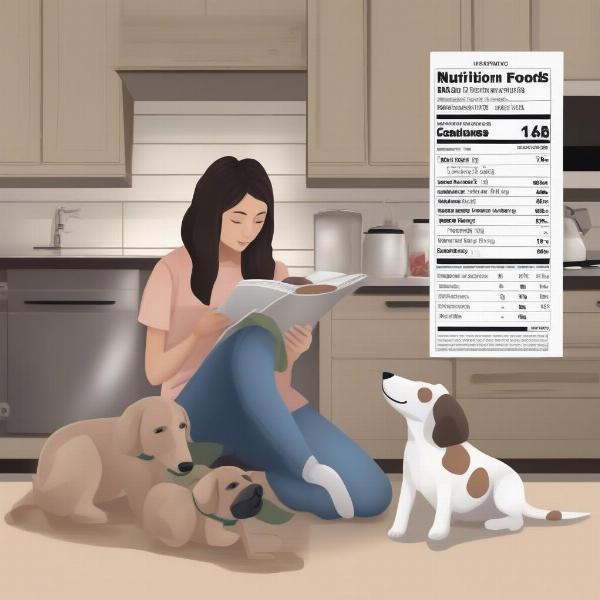Choosing the right food for your puppy is a crucial step in ensuring their healthy development. Limited ingredient dog food for puppies is gaining popularity among pet owners looking for simpler, more transparent nutrition for their young companions. This article will delve into the benefits, potential drawbacks, and essential things to consider when selecting a limited ingredient diet for your growing pup.
Understanding Limited Ingredient Diets for Puppies
What exactly does “limited ingredient” mean when it comes to puppy food? It signifies a formula containing fewer ingredients compared to traditional puppy foods, often focusing on a single source of protein and a limited number of carbohydrate and fat sources. This approach aims to minimize the risk of food allergies and sensitivities, which can manifest as skin issues, digestive problems, and other health concerns. Choosing a limited ingredient diet can make it easier to pinpoint the specific ingredient causing a reaction if your puppy does develop an allergy.
Benefits of Limited Ingredient Dog Food for Puppies
Many pet owners are turning to limited ingredient dog food for their puppies due to several potential benefits. Firstly, these diets can be beneficial for puppies with sensitive stomachs or food allergies. By reducing the number of ingredients, you reduce the likelihood of exposing your puppy to potential allergens. Secondly, a simpler ingredient list often translates to improved digestibility, as the puppy’s system has to process fewer components. This can lead to better nutrient absorption and firmer stools. Finally, the transparency offered by limited ingredient diets gives pet owners a clearer understanding of what they’re feeding their puppies.
Potential Drawbacks of Limited Ingredient Diets
While limited ingredient diets offer advantages, it’s crucial to be aware of potential drawbacks. One concern is the potential for nutritional deficiencies if the diet isn’t carefully formulated. Puppies require a specific balance of nutrients for optimal growth and development, and a limited ingredient diet may not always provide everything they need without careful supplementation. Another factor to consider is the cost. Limited ingredient diets are often more expensive than traditional puppy foods due to the higher quality ingredients used. Finally, some puppies may find these diets less palatable due to the limited variety of flavors.
Choosing the Right Limited Ingredient Food for Your Puppy
Selecting the right limited ingredient food requires careful consideration. First, consult your veterinarian. They can help you assess your puppy’s individual needs and recommend suitable options. Look for foods with a designated “complete and balanced” label by the AAFCO (Association of American Feed Control Officials), indicating it meets the nutritional requirements for growth. Pay attention to the protein source. Choose a high-quality protein that your puppy tolerates well. Common options include chicken, lamb, fish, and turkey.
 Choosing Limited Ingredient Puppy Food
Choosing Limited Ingredient Puppy Food
Transitioning to a Limited Ingredient Diet
When transitioning your puppy to a new food, do it gradually over 7-10 days to avoid digestive upset. Start by mixing a small amount of the new food with their current food, gradually increasing the proportion of the new food while decreasing the old food until the transition is complete. Monitor your puppy closely for any signs of allergies or digestive issues during and after the transition. If you notice any adverse reactions, consult your veterinarian.
Is Limited Ingredient Food Right for My Puppy?
Whether a limited ingredient diet is the best choice for your puppy depends on their individual needs and circumstances. If your puppy has allergies or sensitivities, it can be a valuable option. However, if your puppy thrives on a traditional diet and doesn’t have any known allergies, a standard puppy food may suffice. Always consult your veterinarian before making any significant dietary changes for your puppy.
Conclusion
Limited ingredient dog food for puppies can be a great way to simplify your puppy’s diet and potentially reduce the risk of allergies and sensitivities. However, it’s crucial to choose a complete and balanced formula and to transition slowly. By consulting your veterinarian and carefully evaluating your puppy’s needs, you can make an informed decision about whether a limited ingredient diet is the right choice for your furry friend.
FAQ
- What is the main benefit of limited ingredient puppy food? It reduces the risk of food allergies and sensitivities by simplifying the ingredients.
- Are all limited ingredient puppy foods the same? No, formulations vary. Always check the ingredient list and AAFCO statement.
- Can I switch my puppy to a limited ingredient diet abruptly? No, transition gradually to avoid digestive upset.
- Is limited ingredient food more expensive? Often, yes, due to the higher quality ingredients.
- Should I consult my vet before switching my puppy’s food? Absolutely! They can help determine if it’s appropriate for your puppy’s individual needs.
- What if my puppy doesn’t like the limited ingredient food? Try different protein sources or consult your vet for recommendations.
- Where can I buy limited ingredient puppy food? Pet stores, veterinary clinics, and online retailers often carry these specialized formulas.
ILM Dog is a leading international online resource dedicated to providing expert advice and guidance on all aspects of dog care and wellbeing. From puppyhood to senior years, we offer reliable, practical information on breed selection, health, training, nutrition, grooming, and much more. Whether you’re a new dog owner or a seasoned expert, ILM Dog is here to help you provide the best possible care for your canine companion. Contact us at [email protected] or +44 20-3965-8624 for personalized advice.